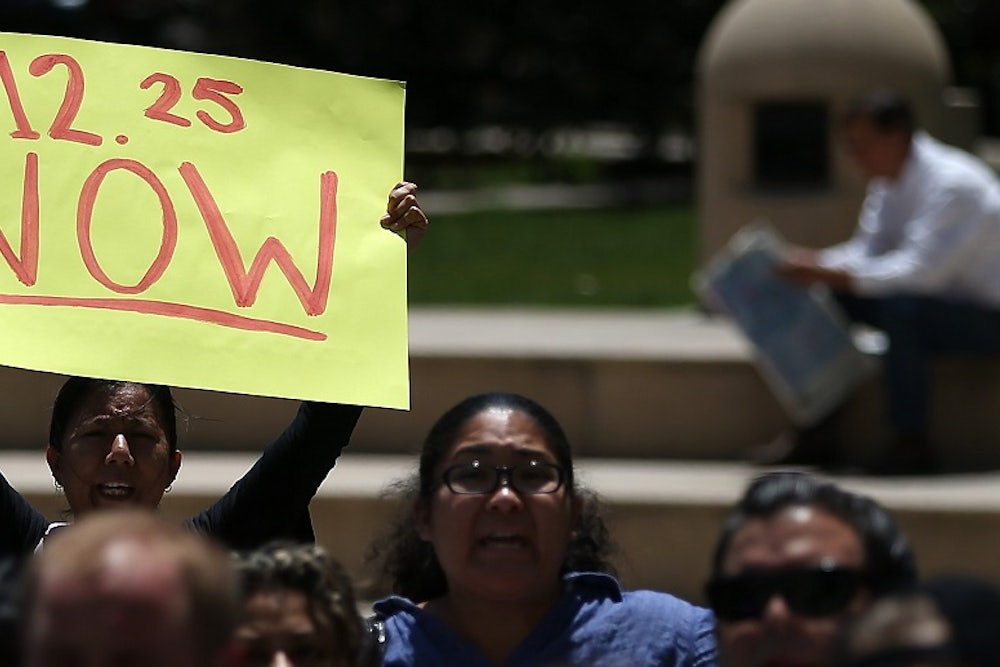Election day is finally upon us! If you watch cable TV tonight, you’ll hear a lot about races in Iowa, Colorado, Alaska, and a number of other states that could determine Senate control. Even with Congress gridlocked, whether Harry Reid or Mitch McConnell is majority leader matters. But there are state races and ballot initiatives that matter much more. Here are four issues that are particularly important:
Medicaid Expansion: Technically, the Medicaid expansion is not on the ballot in any state. But it is effectively on the ballot through gubernatorial races around the country. In Maine, if Democrat Mike Michaud defeats Governor Paul LePage—a Republican committed to blocking the expansion—70,000 low-income Maine residents will receive Medicaid. The same scenario could play out in Wisconsin, where Governor Scott Walker has opposed the expansion. The Republican legislature opposes it, too, but under Wisconsin law, the governor may be able to accept federal funding without the approval of the legislature—or, at the very least, increase pressure on the legislature to go along with it—bringing Medicaid to thousands of low-income Wisconsinites. In Florida, Alaska, Kansas, and Georgia, the election of Democratic or independent governors could bring those states closer to accepting the expansion.
Minimum Wage: Residents in Alaska, Arkansas, Nebraska, and South Dakota will vote to determine whether their respective states should raise the minimum wage. The initiatives are all different. In Nebraska the minimum wage would rise to $9; in Arkansas it would be $8.50. But, if these measures pass, they would raise the hourly pay of thousands of Americans. They could also bring to 29 the number of states that have raised their state minimum wages above the federal minimum. There are also ballot initiatives to raise the minimum wage in Oakland (to $12.25) and San Francisco (to $15).
Marijuana: Ballot initiatives in Alaska, Oregon, and Washington D.C. would legalize marijuana, although each would do so in a different way. In Alaska and Oregon, the initiatives would legalize possession of the drug and direct officials to regulate it for commercial production. The District’s initiative would not legalize commercial sale of weed, but would allow people to possess up to 2 ounces of it legally. Florida will also vote to legalize medical marijuana.
Abortion: In Colorado and North Dakota, voters will decide on “personhood” amendments to the constitution that would define life as starting at conception. In Tennessee, a ballot initiative would not make any immediate changes to abortion law. But it would give lawmakers greater legal flexibility in the future to pass abortion restrictions—something conservatives in Tennessee have sought for years after the state Supreme Court blocked several anti-abortion measures.
This list of meaningful ballot initiatives isn’t comprehensive. Guns are on the ballot in Washington, gambling in Massachusetts and taxes in Georgia. Read Niraj Chokshi in the Washington Post for a rundown of all the state initiatives. But don’t forget that there are also big gubernatorial races in Florida, Colorado, Michigan, Kansas, and Alaska, along with Maine and Wisconsin. All of those will have a big impact on their states’ residents—the same can’t be said of Senate control.
—Danny Vinik
Election Day news:
Odds Republicans take the Senate: FiveThirtyEight 76 percent, The Upshot 70 percent, Daily Kos 90 percent, Huffington Post 79 percent, Washington Post 98 percent.
The House: Republicans are expected to pick up around nine seats. All in all, that’s not a bad showing for Democrats. (Harry Enten, FiveThirtyEight)
State legislatures: It’s much harder to forecast state legislatures but a political scientist gave it a shot. The results: Republicans pick up 5 state senates and 9 state houses. (Carl Klarner, Washington Post)
The races you should follow: Vox’s Andrew Prokop explains the 20 races to watch today.
Stories worth reading:
Would conservatives support a carbon tax? Maybe, says Eli Lehrer, if progressives are willing to make some big compromises. (Weekly Standard)
The miracle of flight: Daniel Gross has identified seven technological wonders of the modern era. First up? The U.S. aviation control system. (Slate)
Willie B. Missed, and Howe: Tom Magliozzi, co-host of “Car Talk” and famed half of the “Click and Clack” duo, died from complications of Alzheimer’s on Monday. He was 77. (NPR.org)
Long read of the day: The Washington Post’s Stephanie McCrummen profiles Virginia State Senator Creigh Deeds, who became an advocate for mental health care reform after his mentally ill son attacked him and committed suicide.
Stories we’re watching:
Midterms
At QED:
Midterms, midterms, midterms. Jason Zengerle zooms in on the North Carolina Senate race that is a bellwether for the country. Brian Beutler writes that Ted Cruz and Mitch McConnell aren’t so different. Danny Vinik and Rebecca Leber weigh in on the future of economic and environmental policy, respectively, with a Republican Senate. Jonathan Cohn produces a map that shows why Republicans are in strong shape to retake the Senate. And Jeffrey Rosen explains why a GOP Senate could be a disaster for the Supreme Court.
Clips compiled by Claire Groden and Naomi Shavin.
